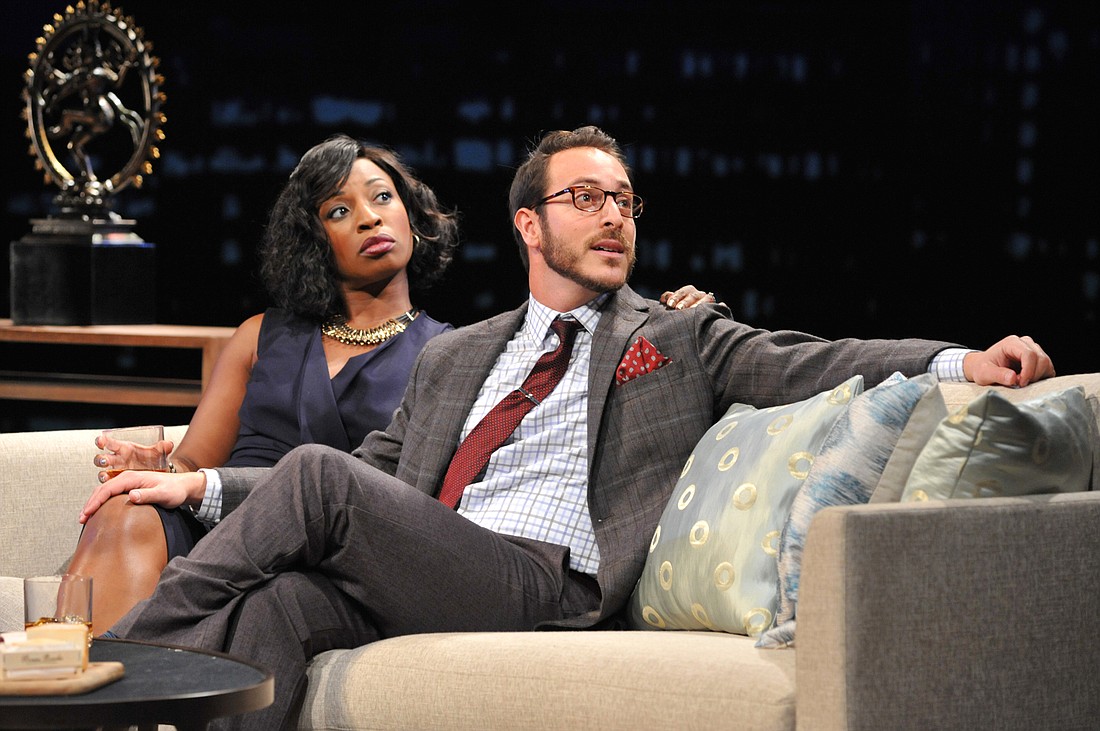- November 23, 2024
-
-
Loading

Loading

Where does cultural identity end and personal responsibility begin? Ayad Akhtar’s Pulitzer Prize-winning “Disgraced” considers this question in the latest Asolo Rep production.
The play unfolds in New York City a few years after 9-11. Amir (Dorien Makhloghi) is a successful lawyer, a Pakistani-American and an ex- Muslim. He violently rejects his old belief system, pointing out its perceived flaws with the crystal clarity of the formerly faithful. His wife Emily (Lee Stark), on the other hand, idealizes Muslim traditions. She’s a visual artist who flirts with cultural appropriation, incorporating the geometric patterns of Islamic art into her own work and painting her husband in the manner of Velazquez’ portrait of his “Moorish” assistant. Amir’s nephew, Abe (Nik Sadhnani) begs his uncle to help his imam, who’s been jailed on charges of funneling money to Hamas.
Amir flat-out refuses. But when a New York Times article links him with the imam’s defense team anyway, Amir’s worst fears come to pass. Guilt-by-association sabotages his chances for partnership at his predominantly Jewish law firm. Amir’s bitterness explodes at a dinner party to rival “God of Carnage.” The couple’s guests—Isaac (Jordan Ben Sobel), Emily’s Jewish art dealer (and sometimes lover), and Jory (Bianca LaVerne Jones), his African- American wife and a lawyer at Amir’s firm—are there to celebrate. But Amir has something to say. In a booze-fueled diatribe, he catalogs examples of Islam’s brutality and backwardness. His borrowed bullet points from Christopher Hitchens and Ann Coulter get him nowhere; Emily and the sophisticated guests refuse to be shocked. So Amir uses himself as Exhibit A—confessing that a tribal enclave in his heart rejoiced at 9-11 and felt a blush of pride at Ahmadinejad’s vow to drive the Jews into the sea. That shocks them, all right. But it’s going to get a lot worse.
The play reaches a boiling point. But director Michael Donald Edwards keeps it low-key and funny until it does. He turns Akhtar’s abundant speechifying into conversational speech—the hip dialog of a politically aware comedy of manners about the colorful ethnic denizens of the New York City elite. Edwards fakes you out with the rhythms of comedy. When the play finally takes a turn to the dark side, it hits you hard.
Makhloghi’s Amir does a slow burn throughout the play. He’s an ex-Muslim, but the dominant culture doesn’t make that distinction. He finally reacts to prejudice by becoming the image of that prejudice—a living caricature of the wife-beating, violent Muslim. Stark’s Emily is charming at first, though her status as a self-appointed cheerleader for Islam gets grating; her enthusiasm seems forced. Sadhnani’s Abe (originally Hussein Malik) has the on/off thinking of a typical adolescent. He’s either hiding his Muslim heritage with a fake name, or applauding its violent extremes. Sobel’s Isaac has some stature and a sense of humor. But his wife is a lot funnier than he is—at least as played by Jones. Her character has zero tolerance for lies, rationalizations and evasions.
The play’s clash of cultures unfolds in a hyper-real bubble. Set designer Reid Thompson creates forced perspective by putting the floor on a slight tilt. Michael Clark’s rear projections flash scenes of New York City and kaleidoscopic vignettes evoking Islamic art. The upscale apartment seems to float above the city, not quite connected to the real world. Beth Goldenberg’s costumes are all about power. With the exception of the hapless nephew, every character dresses for success.
But Amir is the main character—and “Disgraced” is ultimately his character study. Amir’s journey is the point. So, what’s the point? What leads him to disgrace?
Only two explanations make sense. The first …
Society projects a racist image on Muslims—ex-Muslims, included. Amir finally snaps, and turns into that image for real.
That’s my theory, and my sense of Makhloghi’s portrayal. The only other rational explanation …
Amir has betrayed his identity. He changed his last name from “Abdullah” to the more Hindu-sounding “Kapoor.” Worse than that, he doesn’t accept the Koran as the inerrant word of God anymore. He’s an apostate (to use a term I’ve avoided). You can be Jewish and non-religious. That possibility doesn’t exist for Muslims. It’s a faith; it’s a tribe. Amir doesn’t keep the faith and he’s left the tribe. Why? Because he’s ashamed of who he is. That shame is why Amir finally explodes.
This position leaves little room for skeptics and freethinkers of an Islamic background—Salman Rushdie included. I don’t think that’s where Akhtar is coming from. But the playwright refuses to spell things out. He bombards you with questions—and lets you figure out the answers for yourself. That’s good for the mind …
Though not recommended for dinner party conversation.